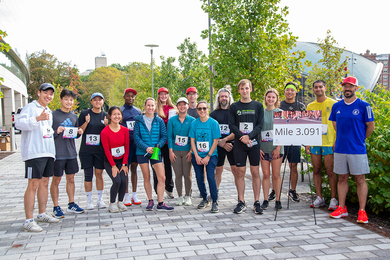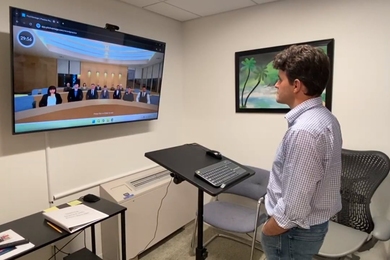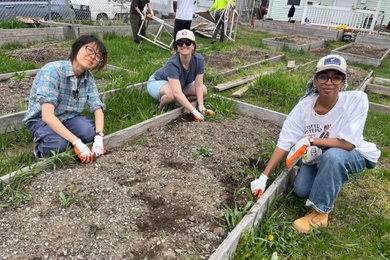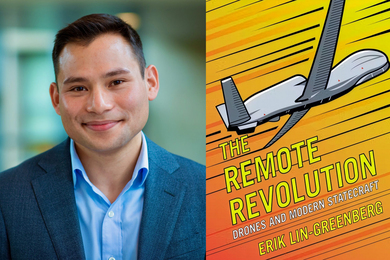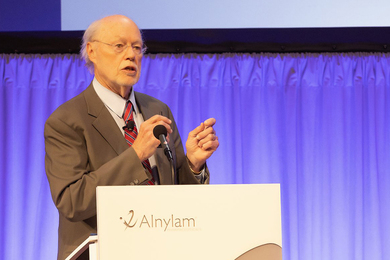Can MIT help engineer a break with history in Jerusalem?
The steering committee of Jerusalem 2050, a joint initiative of MIT's Center for International Studies (CIS) and the Department of Urban Studies and Planning, hopes that the answer is yes.
To that end, the committee has just launched a design competition called "Just Jerusalem: Visions for a Place of Peace."
The idea is to get purchase on the problems of this fractious city by looking at them as challenges in urban design rather than in international diplomacy.
The name of the competition is a bit of wordplay, meant to suggest not only Jerusalem as a city of justice, but also "Jerusalem alone." The competition is based on the question, What if justice and urban livability, instead of competing nationalist projects, were the organizing principles of Jerusalem?
Diane E. Davis, professor of urban studies and planning as well as associate dean of the School of Architecture and Planning, is a director of Jerusalem 2050. As she explained the Just Jerusalem competition at its launch Friday, March 2, "The key motivation was how to think about making Jerusalem a more peaceful, sustainable and just city, a place that's welcoming and satisfying for all its residents, no matter their politics or religious, nationalist or ethnic identities. Now that's no small task."
Richard J. Samuels, Ford International Professor of Political Science and director of CIS, introduced the competition as an effort to "start thinking new thoughts" about Jerusalem.
The light-bulb moment for the group struggling to launch the Jerusalem 2050 project was this realization, Samuels explained: "Perhaps if the conflict could be taken out of its national context and put into a more quotidian one-daily life in the city-perhaps then we could imagine a better time and perhaps we could imagine a better way."
Samuels conceded that the Just Jerusalem competition turns on its head the conventional wisdom in dealing with divided cities by not dealing with political questions first.
So did William J. Mitchell, professor of architecture and media arts and sciences at MIT and one of the international jurors of the competition. But he continued:
"Architecture is a cultural form that forces you to be specific about the organization of daily life. It's about what goes where, it's how you move around, what you confront in your daily life … It's about the metaphors and values that are expressed in your daily surroundings.
"When you put an architectural proposition on the table, people can begin to imagine what their lives could be like in the context of that proposition."
But Just Jerusalem is not just an architectural competition. It has four tracks. Entrants (individuals or teams) are asked to address their contribution to one of four aspects of the infrastructure of the city: physical, economic, civic or symbolic.
The competition is open to the fields of economics, political science, engineering, architecture and planning, and the arts. The winner in each of the five categories will receive a fellowship of up to a year at MIT. The deadline for entries is Dec. 31.
Samuels noted, "Some have questioned the naïveté of a project that's designed to be utopian in a world that's obviously not that."
But keynote speaker Ira Katznelson of Columbia University described it in terms of a "realistic utopia" that would expand the limits of the possible. He cited urban theorist Jane Jacobs's definition of a "city" as a place full of strangers who must feel safe among each other if the city is to function and thrive.
In Jerusalem, the status of "strangers" is more permanent than in Jacobs's New York, he observed. He suggested political scientist Susan Mendus's ideal of "neighborliness," rather than full multiculturalism, as a realistic goal for Jerusalem.
Leila Farsakh, assistant professor of political science at the University of Massachusetts at Boston, a fellow at MIT's Center for International Studies and a co-director of Jerusalem 2050, suggested that the project might help give rise to a new concept of "citizenship" in Jerusalem. "Visioning allows us to transcend the present impasse."
"We're trying to engineer a break with history," Samuels said. "That's not something that happens very often, but it's happened before, and even having happened once, it seems to us, that's often enough to give us hope that it could happen again, even in Jerusalem."
A version of this article appeared in MIT Tech Talk on March 7, 2007 (download PDF).





